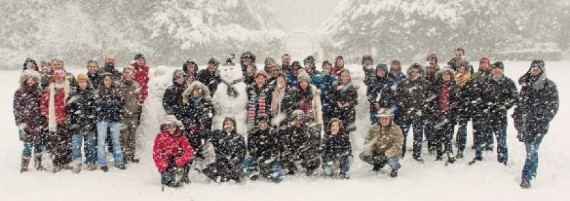Making a better future

The EPSRC Centre for Industrial Sustainability, based at the IfM is a collaboration between academics at the IfM, Cranfield, Imperial College London and Loughborough and aims to help support and accelerate the transition to this ambitious but necessary vision of the future of manufacturing.
Founded in 2011 with funding from the EPSRC and supported by Industry members, networks and organisations, the Centre set about conducting research into key challenges for industrial sustainability – understanding how we can be more efficient today, how the next generation of factories should be designed and managed and how the whole industrial system might change.
This research is always done in close contact with industry so that the work is grounded and industrially relevant from the definition of the research challenge to the delivery, packaging and implementation of the knowledge arising from the research.
Now, in our fourth year, the EPSRC Centre for Industrial Sustainability is busy taking that hard earned knowledge and turning it into tools that manufacturers can use directly, and with increasing frequency. We are working with our industrial partners on their new factory designs, including the Vitsœ factory in Leamington Spa, a new jeans factory for Saitex that will be ‘net-positive’ (cleaner and more equitable than its inputs) and a benchmark 60,000 staff industrial park for Brandix. Marks & Spencer is using our business model research to guide its efforts to reduce customers’ total clothing waste by 50% while delivering higher value, while Altro and FMCG collaborators are using our new insights on changeovers to make themselves even more eco-efficient.
 |
| Our people at the EPSRC Centre for Industrial Sustainability |
The importance of non-labour resource productivity does not diminish and we are bringing this knowledge into industry and into policy making, while our circularity research has found new and helpful ways to operationalise the popular ‘Circular Economy’ concept and make it practical.
Looking to the near future we can see a number of key trends and have invested in some already. Gamification is an exciting way to communicate knowledge and we are already using this with Airbus. We expect much more modelling content in our future research as we move from identifying the variables that matter to characterising those variables and simulating them. We are using agent-based modelling to explore business models and also real-time data feeds to simulate operation performance under variable conditions. In response to industry demand we have increased our research into sustainable design and into circularity (sometimes together).
We are very happy to be supported by knowledgeable and ambitious collaborators, who push us and keep pushing us. If you would like to become one of those partners or simply wish to learn more about us contact Ian Bamford, Commercial Director, directly: imb31@cam.ac.uk
Article originally appears in the Cambridge Engineer (Cambridge University Engineering Society Magazine. CUES was founded in 1901 with a principle goal of stimulating and promoting engineering enthusiasm amongst students. The society's magazine was established shortly afterwards to help realise this goal with the earliest magazine on record dating back to 1923. In those days the magazine operated more like a journal - the articles were more of an academic nature. However, in recent years, the nature of the articles has diversified, and CUES has been promoting the rewriting of technical pieces of work into more layman terms, whilst keeping the key points, in order to increase accessibility and entertain a wider audience.










